The Characters We Love
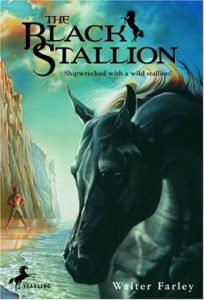 Alec Ramsey was my hero. He was a gutsy kid, resourceful and caring. And he was a survivor. Dumped into the ocean on a voyage to see his uncle, Alec and a wild stallion he called the Black, made it to a deserted island where they built a connection. And so, a series of books was born based on a beloved character and his horse.
Alec Ramsey was my hero. He was a gutsy kid, resourceful and caring. And he was a survivor. Dumped into the ocean on a voyage to see his uncle, Alec and a wild stallion he called the Black, made it to a deserted island where they built a connection. And so, a series of books was born based on a beloved character and his horse.
Over the years, I’ve come to love many more characters beside Walter Farley’s young protagonist. There is Elizabeth Bennet in Pride and Prejudice, Jo March of Little Women, Tom Sawyer and Huck Finn in Mark Twain’s classics. I even loved Scarlet O’Hara of Gone with the Wind, though I hated her a little, too.
I could go on and on listing characters I loved who appeared as the star of their books, but there’s another set of characters that aren’t front and center, yet they nearly steal the show.
Perhaps no character so embodies the enticing secondary character as does Falstaff in Shakespeare’s Henry IV Parts I and II and The Merry Wives of Windsor.
“Falstaff is perhaps the most substantial comic character that ever was invented,” one scholar said (See Shakespeare Online). Any number of works have been written in an effort to dissect what makes him so beloved, and other stories have been created to put him in the spotlight.
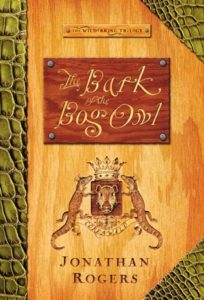 In contemporary Christian speculative fiction I can think of several secondary characters that hold great appeal and nearly demand a book of their own. One is Dobro in Jonathan Rogers’ Wilderking Trilogy.
In contemporary Christian speculative fiction I can think of several secondary characters that hold great appeal and nearly demand a book of their own. One is Dobro in Jonathan Rogers’ Wilderking Trilogy.
The main character, Aidan, is himself endearing, but Dobro, though having a minor role, is memorable. Here’s his introduction in the first of the trilogy, The Bark of the Bog Owl.
Aiden had never seen such a person, but he thought he knew what he was. He was one of the feechiefolk. Aidan’s grandfather had told him many tales of this wild, nomadic tribe … But then again, Grandfather had often invented wild tales to entertain his grandchildren.
The house servants often threatened to throw him to the feechiefolk when he misbehaved, but Aidan had always assumed the feechiefolk were imaginary creatures, like leprechauns or boogiemen. Yet here before him stood what appeared to be an actual feechie boy. Aidan had no idea what this wild boy might do next. He was fierce–no question about it–but not exactly threatening. On the other hand, he didn’t appear to be friendly either. He was just wild; there was no other way to describe him.
The two boys regarded one another. At last the wild boy’s nasally voice broke the silence. “Are we going to tangle or not?”
Dobro is quirky and courageous, a fierce fighter and a loyal friend. The feechie in general are unforgettable, but Dobro rises above all others.
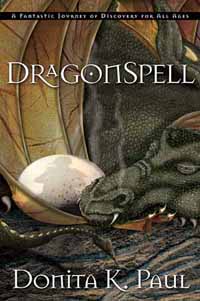 Another similar character appears in Donita Paul‘s DragonKeeper Chronicles: Dar of the doneel race. Here’s his introduction in the first of the series, DragonSpell.
Another similar character appears in Donita Paul‘s DragonKeeper Chronicles: Dar of the doneel race. Here’s his introduction in the first of the series, DragonSpell.
The whistling first sounded like a double-crested mountain finch, but then a few too many high notes warbled at the end of the call. Kale’s eyes sprang open, and she sat up. A doneel sat on a log by the stream. From his finger, a string dangled over the edge of a rock into the water. His clothes were tattered but bright in hue between the smudges of dirt and blood. His whistle changed to the song of a speckled thrush.
…if he stood, his little frame would not reach four feet. His tan and white furry head sat on a well-proportioned body. His large eyes hid under shaggy eyebrows that drooped down his temples and mingled with a long mustache. His broad nose stuck out like the muzzle of a dog, and his black lips met with hardly a chin at all underneath…
“Hungry?” he asked. Smiling, his face became round, half of it the huge mouth. Two ears covered with soft fur perched on the top of his head near the front. They twitched and turned as he listened.
Dar is particular when it comes to fashion and style. He seems austere in his treatment of others, and can be intimidating despite his small stature. But he, too, is a fierce friend, loyal to the core.
Actually, Ms. Paul has created other memorable minor characters: Wizard Fenworth, with bog creatures nesting in his beard and his habit of becoming treelike to the point that it’s hard to tell him apart from the real thing. Or how about the little fainting minor dragon, Gymn.
Some stories are notable because of the action and their fast pace, others because of their epic nature, and still others because of their vivid world. But when it comes to characters, which stand out in your mind? Are they protagonists or minor characters? And what about them makes them memorable?


































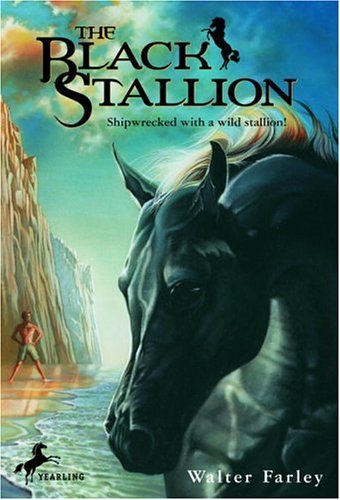


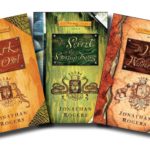
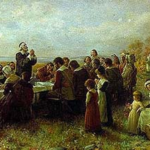





One of my favorite secondary characters is Prince Imrahil from The Return of the King. I remember him being sensible, a loyal follower, and dedicated battle-leader. A pity that he was left out of the movie!
Another charming secondary character is Grumio from The Taming of the Shrew. He’s likeable because he’s purposefully funny–he puns and equivocates every few lines!
I am embarrassed to say I don’t remember Prince Imrahil. In Lord of the Rings, Samwise Gamgee was by far my favorite secondary character. He was LOYAL to the core, and loving, hardworking, discerning, brave. He’s one that almost stole the show for me.
Becky
Oh, yes, we can’t forget about Sam!! (Although I count him as one of the main characters, right up there with Frodo and Aragorn and Gandalf and the rest. But that’s just me. :-))
Prince Imrahil walked the walls with Gandalf renewing the courage of men under the Nazgul’s despair while Faramir was dying and Denethor descended into madness.
Similarly he was the lord of Minas Tirith after Denethor died because Aragorn chose not to reveal himself until after Sauron was defeated.
It is amazing really how important he was to everything that happened in Gondor in light of how few lines even mention him.
I don’t think that I’m a very character oriented reader. Thinking back over my favorite characters, I don’t think the ones that are most memorable to me are necessarily the ones that are most colorful or uniquely characterized. I love lots of secondary characters who are strong but very standard representations of their character archetypes, such as Lan from The Wheel of Time.
But for The Lord of the Rings, Merry wins, hands down!
Ron Weasley anyone?
Secondary characters really color a story for me. The cast of characters that surround Liesel in The Book Thief come to mind. I can also envision books specific to many of the Tributes in Suzanne Collins’ Hunger Games trilogy. Maybe prequels, cause you know, things go a bit awry there at the end.
I’d pick Hermione over Ron. I’d pick her over Harry too. 😛 But that’s just me.
Becky
I hadn’t thought of Alec Ramsay in quite a while! I loved those books too. Found myself in Queens a few years ago and was imagining the semi-rural place described in those books. It sure doesn’t look like that now.
When I started thinking back to books I loved, Alec came to mind first.
My brother also had a number of The Sugar Creek Gang books. Once in a while my dad would read us one of those, and I loved those characters–the narrator, Bill, I think he was, and then Little Jim and the gang leader Big Jim. I read one of those a few years ago, just to see what I thought of it now as a writer. Honestly, I was impressed. I’m sure some people would say it was preachy, but references to God and to prayer, church, making right choices came from the characters and was quite believable if you allow for Christian characters who aim to live in obedience to God’s word.
All that aside, I can imagine that Queens now is nothing like Farley portrayed it in his books. Not too many boys keeping horses, I dare say.
Becky
Oh, I loved Alec Ramsey too! Mostly I loved his horses, but he was the human connection to them. In LOTR, one of my favorite characters is Faramir–I didn’t like how his role was changed in the movie, although he did turn out all right, and his romance is included in the extended version. I think my favorite side character in HP was Professor Lupin, but that didn’t turn out well for me. LOL
I know it’s probably odd to fall in love with a character invented by my daughter, but I absolutely adore Sir Eanrin/Monster in the Tales of Goldstone Wood. He will be a main character in book 4 in the series, Starflower, and then I’ll have to share him with the rest of the reading world. 😉 I also love Lionheart, although I confess a frequent desire to throttle him. Possibly because I relate to him all too well.
One of my first literary loves was Bree the talking horse in the first Narnia book I read at age 8. But once Aslan entered the scene, Bree faded into the background. Ah, literary love!
I love your daughter’s books, btw. And the throttle/love conundrum is a familar one for me as well.
I’d have to say the “minor” characters I love the most are from the Mistmantle Chronicles, but the line between major and minor is so blurred in those books. Almost everyone shows up in more than one book, with differing stage time but I love them all so much. Urchin and Crispin as much as Hope or Pitter.
To me, much of a story’s enjoyment and even meaning is carried by the characters. They’re the human side of things. It often happens that I like secondary characters more than the main ones. To give a few examples:
In The Vanishing Sculptor, my favorite character was Lady Peg (other supporting characters, such as the wizard and his librarian, came in close seconds). Her mind worked in strange and enormously entertaining ways.
My favorite character in the Legends of Karac Tor series was Cruedwyn Creed, the bard without a harp. There was something comic, then endearing, then finally moving about him.
Far and away, the supporting character who most stole the show for me was Artham P. Wingfeather. He was riveting from the moment he first appeared on the page as Peet the Sock Man. He was sorrowful without being mawkish, admirable without being cliched. In all three books of the Wingfeather Saga, my favorite moment is his transformation. “He rode the pain like a knight rides a horse.”
There is always a strain of personal bias in these things, but I can state two reasons why these characters rose above the main cast. Either because of their uniqueness (Lady Peg) or their complexity (Artham), they felt more vividly realized, more genuinely themselves. And they were evocative. Whether they evoked amusement or sympathy or admiration, they earned an emotional reaction.
I love this Black Stallion book; the story is really awesome and full of important thoughts. I have finished reading the book and it is worth that read. If you love black stallion, you will surely enjoy reading this book. The other books you have are also interested to read. I will look these sorts of books and have copies of them.